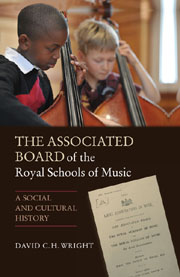Book contents
- Frontmatter
- Contents
- List of Illustrations
- List of Tables
- Dedication
- Preface
- List of Abbreviations
- Miscellaneous Conventions
- Introduction: The Context for a History
- I THE BACKGROUND
- II THE BOARD ESTABLISHED, 1889–1920
- 3 The ABRSM Idea and the First Exams, 1889–91
- 4 The Early History, 1892–1920
- 5 The ABRSM and the ‘British World’
- III THE INSTITUTIONAL CULTURE, 1920–83
- IV THE BOARD REVIVED, 1983–2009
- Appendix 1 Speech and Drama Examinations
- Appendix 2 ABRSM Personalia, 1889–2010
- Select Bibliography
- Index
5 - The ABRSM and the ‘British World’
from II - THE BOARD ESTABLISHED, 1889–1920
Published online by Cambridge University Press: 05 July 2013
- Frontmatter
- Contents
- List of Illustrations
- List of Tables
- Dedication
- Preface
- List of Abbreviations
- Miscellaneous Conventions
- Introduction: The Context for a History
- I THE BACKGROUND
- II THE BOARD ESTABLISHED, 1889–1920
- 3 The ABRSM Idea and the First Exams, 1889–91
- 4 The Early History, 1892–1920
- 5 The ABRSM and the ‘British World’
- III THE INSTITUTIONAL CULTURE, 1920–83
- IV THE BOARD REVIVED, 1983–2009
- Appendix 1 Speech and Drama Examinations
- Appendix 2 ABRSM Personalia, 1889–2010
- Select Bibliography
- Index
Summary
The ‘British World’ idea
THE ABRSM's exams contributed to the activity of cultural exchange that was constantly happening between Britain and its Empire. This chapter looks, albeit briefly, at some of what was involved with this aspect of the Board's history. Recent historiography has brought something of a sea change to explanations about the dynamics of Empire. Some historians have moved away from the traditional focus on nations and the history of regions to explore a more integrated view based on the idea of a community of Empire. The British Empire was characterized by the endless criss-crossing of its citizens, constantly on the move as they pursued mercantile, professional or jobbing interests, taking with them their cultural, social and religious views or values, shaping the perspectives of those they encountered along the way. Migration was another characteristic of Empire, with some motivated by the prospect of making new lives, and some by the hope of disappearing completely from their old ones. In other words, the everyday process of Empire involved the participation of ordinary people even more directly than it did the political wishes of a governing elite, something that has been referred to as ‘globalization from below’. The ABRSM was very much part of this process of Empire, its examiners participating in this cavalcade of movement and exchange of networks that helped generate the cohesive force of what some historians have come to label the ‘British World’.
- Type
- Chapter
- Information
- The Associated Board of the Royal Schools of MusicA Social and Cultural History, pp. 92 - 102Publisher: Boydell & BrewerPrint publication year: 2013



